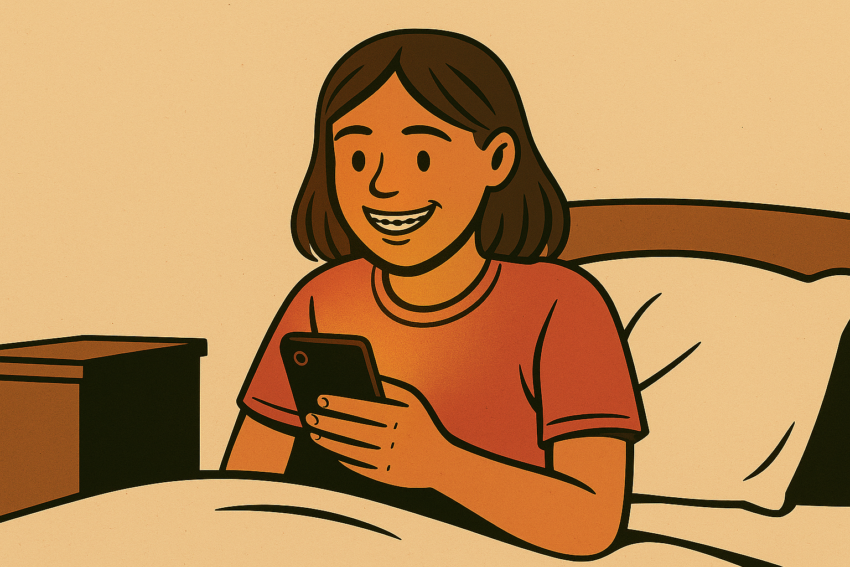Teenagers today are growing up with a second nervous system, and it is digital. Their moods shift with every buzz. Their self-worth rises and falls based on likes, comments, and follows. Their friendships unfold in curated stories and disappearing messages. And all of this is happening while their actual nervous system is still developing.
This is not just a phase they will grow out of. It is a neurological reset happening in real time. Their brains are being trained by systems designed to hook attention, provoke emotion, and reward impulsivity. These systems are shaping identity before it has had a chance to settle.
If you are a teenager or the parent of one, you have probably felt the pull. That tension between the real world and the one inside the phone. The disconnection that sneaks in even when someone is right next to you. The difficulty of unplugging even when you know you need to. It is not weakness. It is design. Their brains are being shaped every time they scroll, swipe, or wait for a notification. The changes are real and they are deep.
During adolescence, the brain is still under construction. The prefrontal cortex, which handles impulse control, long-term planning, and rational thought, is still developing well into the twenties. Meanwhile, the limbic system, which processes emotion and reward, is already running at full speed. This imbalance means teenagers feel things intensely but often struggle to regulate those feelings. Social media is built to exploit that gap. It delivers stimulation fast and feedback faster. It keeps emotions high and reflection low. It does not ask for patience or perspective. It asks for reaction.
That is why social media fits so well into the teenage brain. It activates the reward system through likes, shares, and notifications. These trigger the release of dopamine, the brain’s chemical for pleasure and reinforcement. Over time, the brain adapts. It starts needing more stimulation to get the same feeling. The post has to be more perfect. The timing has to be strategic. The response has to be just right. When the attention does not come, anxiety follows. Shame creeps in. Self-worth takes a hit.
What begins as fun becomes something much heavier. It becomes a metric. It becomes a measurement of identity. And in that space, teenagers stop being themselves and start becoming performers.
Teenagers have always struggled with comparison. That is part of growing up. But now the comparison is constant and global. It is not just classmates or teammates anymore. It is influencers, celebrities, and curated strangers with perfect bodies, perfect lives, and perfect lighting. Even when teens know the images are fake, the feelings they trigger are real. They look in the mirror and see someone who does not measure up. They start believing they are behind, not good enough, or invisible. That kind of comparison is exhausting. And it is dangerous.
Before social media, self-expression happened in real life. It was messy and awkward and honest. Now, every post is edited, filtered, and carefully timed. Teenagers are not just sharing anymore. They are managing a brand. They are curating a public version of themselves that often has little connection to who they are. The pressure to perform becomes constant. Mistakes feel permanent. Silence feels like failure.
This is not a rant against phones. It is not a call to ban technology. That is not realistic, and it misses the point. The phone is not the enemy. The problem is what it is replacing. Face-to-face connection. Long conversations. Unfiltered emotion. Rest. Imagination. Silence.
So what can be done?
Start with honest conversations. Talk about how these platforms work. Explain how they are designed to keep people scrolling. Teach teenagers what is happening in their brains so they can recognize the patterns. Awareness is the first step toward change.
Set boundaries. Create tech-free time. At meals. Before bed. During family time. It will feel uncomfortable at first. That is normal. That is the part that matters.
Model the behavior you want to see. Teenagers watch more than they listen. If they see adults constantly distracted by phones, they will believe that is normal. Show them what balance looks like.
Help them find value offline. Sports. Art. Volunteering. Reading. Conversations. Relationships that are not tied to screens. These things build confidence that does not depend on public approval.
This is not about fear. It is about responsibility. Social media is not evil, but it is not neutral either. If we are not intentional, it will shape an entire generation to chase attention but never find peace. To perform constantly and still feel unseen. To depend on likes instead of learning how to like themselves.
We are not raising followers. We are raising people. And people need more than algorithms. They need meaning. They need grounding. They need adults who are willing to step in, speak up, and remind them that they are more than a profile. More than a feed. More than a moment of engagement.
They are still becoming. And who they become should not be left to chance.
About the Author: Adam Faight is a college director, psychology instructor, and author based in Johnstown, Pennsylvania. He explores the intersection of technology and human behavior, writing extensively on topics such as social media’s impact on mental health and modern relationships.
